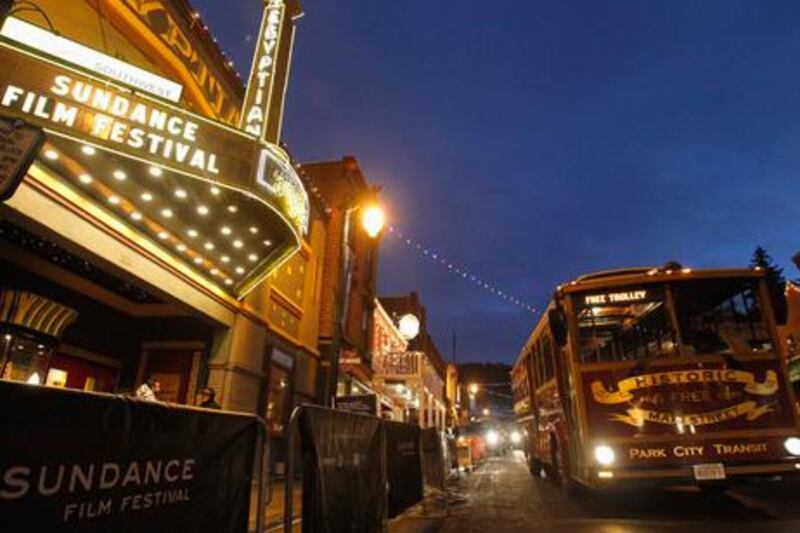In conflict there is drama, the saying goes, and there is publicity. Before the curtain rose on the 2012 Sundance Film Festival, a lawsuit usurped the spotlight at an annual event that has never wanted for attention.
Opening today and running until January 29 in Park City, Utah, this year's festival of 117 feature films was eclipsed by a legal salvo from the man who is building the largest house in the United States. David Siegel, a real estate timeshare entrepreneur, complained that a documentary which opens the festival defames him, basing his charge on a festival catalogue description of his career as a "rags to riches to rags" story. Siegel insists that he and his business - which includes the Westgate Park City ski resort — are thriving. The Queen of Versailles, directed by Lauren Greenfield, chronicles the construction of Siegel's 90,000 sq ft house near Disney World in Florida during a sagging economy. Sundance stands by its commitment to show the film.
Siegel and his manor - now for sale at US$100 million (Dh367m) - have received plenty of attention. He won't be alone in the media glow at Sundance, always a mix of seriousness and celebrity. Even in a struggling economy, demand is surging for tickets, hotel rooms and limousines in this former mining town.
For more than 20 years, the essential annual event for young independent filmmakers has also been a talent hunt for Hollywood studios on the trail of the next Steven Soderbergh or Quentin Tarantino.
"The majors are there to find talent, the agents are still there to represent some director from a small film," said the veteran executive Bob Berney, the president of FilmDistrict Theatrical.
"There's always a chance that something will pop out, maybe the new Little Miss Sunshine."
Once again, Sundance is also a destination for improbable projects - films by actors as directors and non-commercial labours of love sustained by marquee names. Julie Delpy is the auteur of Two Days in New York, in which she co-stars with Chris Rockin in a sequel to her Two Days in Paris. Rory Kennedy, the daughter of Robert F Kennedy, will show Ethel, a documentary portrait of her mother.
Among the most anticipated films is West of Memphis, a documentary by Amy Berg about three men wrongfully convicted of murder in 1994 - one sentenced to death, and two to life terms. Produced by Peter Jackson (Lord of the Rings, The Hobbit) and his wife Fran Walsh, the film revisits the brutal killings of three boys in West Memphis Arkansas, followed by the trials of three teenagers, one of whom made a confession that he later said was forced. The three defendants were freed in August after 18 years in prison. Damien Echols, who was on death row less than a year ago, is a co-producer of West of Memphis.
Since the 1994 convictions, Jackson, Johnny Depp and other entertainment figures rallied for the release of the West Memphis Three, as the defendants are called. Jackson wasn't the first to film their story. The case has been the subject of Paradise Lost, the documentary trilogy by Joe Berlinger and Bruce Sinofsky. The latest chapter is shortlisted for a nomination as Best Documentary in this year's Oscars. Yet if Jackson is late to the game, the notoriety of the West Memphis case is far from exhausted. The story is also being made as a feature film by the Canadian director Atom Egoyan.
In a radio broadcast last week, the Sundance founder Robert Redford cited documentaries as a strength at the festival. "Once the festival survived, we were able to then use the festival to start promoting documentaries more and more and more, and that was 1989. Then, when we went into the 1990s, globalisation created a new opportunity, to bring films from other parts of the world to Sundance, including documentaries. So documentaries gained steam all through those early years."
If there is a recurring subject in documentaries at Sundance this year, it is a perennial festival theme - the widening gap between the rich and poor.
As business cools in much of the film world, Sundance has evolved into a big tent, sheltering crusading documentarians and filmmakers who were once welcomed by the major studios. Along with Jackson and Berlinger, veteran directors with dramatic features to show and sell to distributors are part of the mix this year. Spike Lee will premiere Red Hook Summer, a period film set in the 1970s about a boy from Atlanta, Georgia, sent to a rough Brooklyn housing project for the summer. Lee, who plays a supporting role, has had few words about his film and none about its small budget, noting that the self-financed project preserved his freedom to make the film of his choice.
"Filmmakers are coming back to independent film, as a choice," said the Sundance Film Festival director John Cooper. Or as a necessity, insiders note. Also on hand is Stephen Frears, now 70, with Lay the Favourite, a drama about a Las Vegas cocktail waitress who becomes a gambling prodigy. It stars Bruce Willis and Catherine Zeta-Jones, Hollywood names who might not have appeared at the indie-fest in more lavish times. Kirsten Dunst (Bachelorette) and Richard Gere (Arbitrage) are two other actors at Sundance 2012 who fit that description.
Filmmakers from the Arab and Muslim worlds will be joining them in Park City, among them Nadine Labaki, whose Where Do We Go Now? is Lebanon's nominee for Best Foreign Language Film at the Oscars. In My Brother the Devil, developed at the Sundance Lab in Jordan (and in Utah), Welsh-Egyptian Sally El Hosaini's first feature finds two Egyptian brothers assimilating into Britain through its gang culture.





